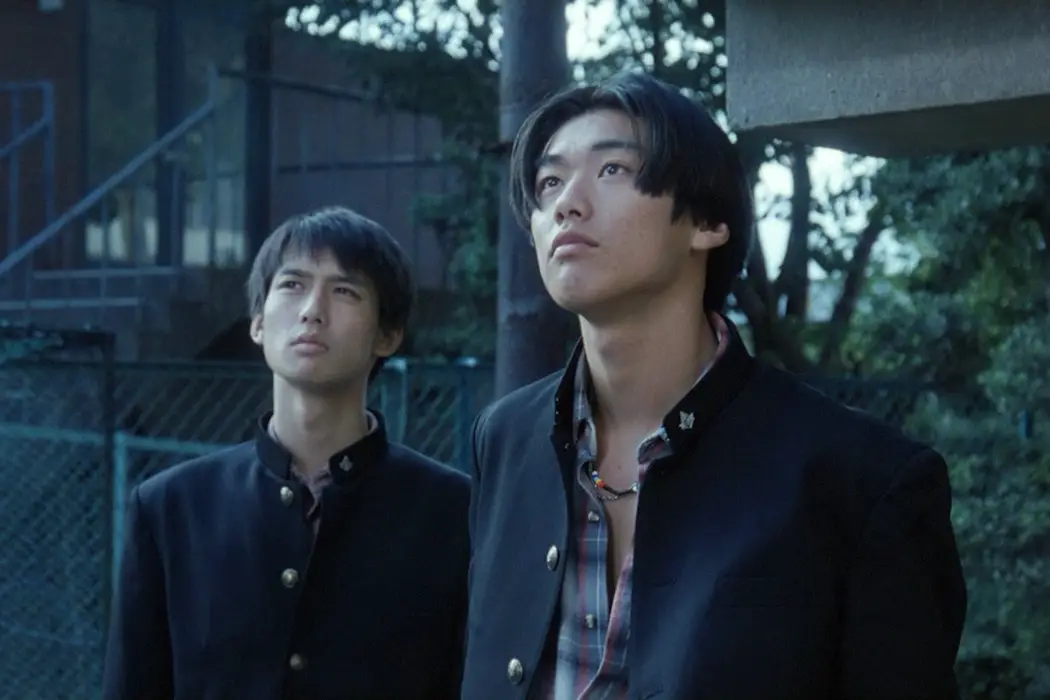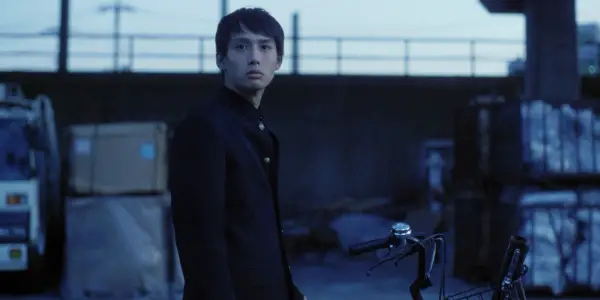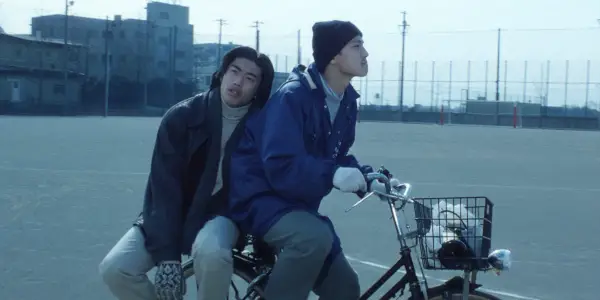Growing Pains: Coming of Age, Kitano-Style, in KIDS RETURN

Freelance writer based in London. Pacino fanboy and trash connoisseur.
The turning point of Takeshi Kitano‘s 1996 coming-of-age masterpiece Kids Return arrives about a third of the way through the film, in a sequence of startling beauty and poignancy. Swaggering, pugnacious high school dropout and burgeoning boxer Masaru (Ken Kaneko), invites his meeker best friend Shinji (Masanobu Andō) to spar with him. It’s an invitation that you’d think would end with Shinji on the canvas, since it’s Masaru who gravitated towards the sport in the first place, already styling himself as the “Dynamite Kid”—Shinji, an infinitely less abrasive boy, doesn’t really have a taste for combat, simply going along with whatever his buddy does, as always. What follows is a stunning reversal, as Shinji proves himself to be the one with the all the right instincts, all the power, all the finesse, flooring Masaru over and over again in supple slow motion shots that linger upon Masaru’s crumpled body. The neophyte emerges as the victor, while the crestfallen Masaru consoles himself with booze and abandons his ambitions, telling Shinji: “You can be the Dynamite Kid. I’ll find something else.”
From here, the two boys, once inseparable in their bond of delinquent detachment from the tedium of teenage normality, embark upon their individual journeys—without saying goodbye, Masaru disappears into the underbelly of uncertainty, resurfacing as a lieutenant rising through the ranks of the yakuza, while Shinji makes a name for himself in the world of boxing, notching up win after win. When their paths eventually converge again, the moment is intensely bittersweet, Kitano‘s graceful camera drinking in the tenderness of their gazes, capturing the shared yearnings and regrets that go unspoken. Their reunion is all too brief—Masaru has business to attend to, and Shinji has a training regiment to follow. “One day you’ll be a champ and I’ll be a boss,” says Masaru, “Let’s meet then.”

In the end, of course, neither of them get that far—the insolent Masaru pays the price for disdaining the traditional yakuza power structure, while Shinji, bereft of Masaru’s counsel, falls under the tutelage of washed-up pugilist Hayashi (Moro Morooka), careening into undisciplined indulgence and athletic decline. Their downfalls are swift and unceremonious—Kitano‘s is a world in which sadness prevails and good things never last, innocence ineluctably disrupted and corrupted by explosive violence. Painterly dreams—dreamt by gangsters, cops, and ordinary teenagers alike—end up splattered with red, as serenity gives way to brutality. And yet the warmth of Kitano‘s particular brand of brotherhood still glows on the palate long after the acidity of his cynicism has subsided.
Losers and Lacunae
The unfussy, unpretentious elegance with which Kitano wordlessly yet poetically articulates the melancholy of youth in Kids Return, is instantly identifiable as the same elegance with which he crafts the cruel, totemic crime films for which he’s best known, flowing from the same formal wellspring. It’s quite remarkable to see just how smoothly the auteur transfers his idiosyncratic deadpan aesthetic, with its focus on stillness and the interruption of stillness by appalling bloodshed, from those early works like Violent Cop, Boiling Point, and Sonatine, to the coming-of-age genre here (he’d actually already dipped his toes into this sort of territory with his 1991 film, A Scene at the Sea, about a deaf young man’s nascent passion for surfing, but Kids Return is so much sharper, so much more refined). The languid camerawork, the evocative intercutting, the matter-of-factness of the violence—these visual hallmarks lend themselves perfectly to the tempo of Masaru and Shinji’s leisurely excursions to nowhere in particular, as the two eternal outsiders negotiate the perilous mire of mediocrity without any sense of conviction or idealism, searching fruitlessly for some sort of purpose.
Perhaps just as crucial as Kitano‘s style is his sense of setting—his acute sensitivity to the memories that become inextricable from specific places, the routines, and rituals that give those places meaning. Kitano invites us to become invested in the spaces that Masaru and Shinji haunt—their cycling route to school, the rooftop from which they play juvenile pranks, the local coffee shop, the cinema where they try and fail to buy adult tickets, the noodle bar where they first encounter the yakuza, the boxing gym where their dreams are ignited and smothered—and then leaves us to stew upon how these spaces become mere lacunae in the absence of companionship. When Masaru drops out of school, Kitano lingers upon the voids that are left behind in Shinji’s world, which suddenly feels astonishingly empty—it’s impossible not to fixate upon the vacant chair in the classroom, the silence and loneliness of the city when there’s nobody with whom to share moments and experiences. There’s something quite romantic about the idea that male friendship can reshape an entire landscape, imbuing the mundane with emotional weight and sublimity—a bike ride is somehow more than just a bike ride, a coffee break more than just a coffee break, a bowl of noodles more than just a bowl of noodles.
Male friendship, with its beers and its bruises, is the lifeblood of Kitano‘s oeuvre—it’s not a thematic preoccupation that’s unique to him, of course, but it’s a testament to him as a storyteller and craftsman that he makes it feel totally singular. Kitano‘s masculine relationships are so vivid, so distinctive because he dispenses entirely with the conventional narrative beats, the peaks, and troughs, that usually come with those sorts of dynamics and with the coming-of-age genre at large. Instead, he fills his films to the brim with grace notes—those interstitial, amorphous moments of downtime, with their seductive rhythms, become the main body of his work, allowing his characters to truly breathe, laugh, and hang out. Masaru and Shinji’s intimacy is felt not through plot or dialogue, but through sumptuously composed images of their unremarkable neighbourhood, through the dulcet tones of the great Joe Hisaishi‘s blissful score, and through the sensitivity and generosity of Kaneko and Andō‘s performances.

What’s especially bracing about Kitano‘s approach to this sort of material is just how much affection he has for his peripheral characters. A lesser film might be more isolating, might tether us exclusively to the interiority and experiences of its heroes, surrounding them with mere cardboard cut-outs—but Kitano‘s ecosystem is teeming with life outside of Masaru and Shinji that feels just as vibrant and tangible as the two protagonists, complexly-drawn people with their own aches and ambitions. There’s Hiroshi (Michisuke Kashiyawa), Masaru and Shinji’s sincere, timid classmate, who struggles to come to terms with the ruthlessness of working life, and who’s ridiculed for his repeated romantic overtures towards Sachiko (Yūko Daike), a girl working at the local coffee shop; there’s the grizzled Hayashi, who, acting as Shinji’s surrogate companion after Masaru’s departure, taps into the younger man’s worst impulses, passing down the dark arts in a pathetic, and ultimately quite moving attempt to recapture some residual trace of an exciting past now long gone; and there are the two budding comedians, played by Peking Genji and Kyōsuke Abe, who we see persisting with and polishing their rapid-fire double act, hoping to break into the world of stand-up despite lukewarm reactions in the schoolyard. It’s rare to see so many stories so lovingly woven, each inspiring their own laughter and heartbreak.
Lost Generation
Kitano‘s urban tapestry is thick with tactile tranquility and a constant sense of limitation—something about Masaru and Shinji’s environment feels prohibitive, stifling. Where there’s an abundance of simple pleasures, there’s also a striking paucity of opportunities—no proper guidance, no role models, no prospects, no way out. The adult presences in the film are uniformly useless: the high school teachers might as well not exist, responding to both obedient and disobedient behaviour with equal apathy, without rewards or sanctions; the local boxing coach is a feeble figure, holding less sway over the impressionable Shinji than a pathetic has-been; Masaru’s yakuza superiors are antiquated and vulnerable, at risk of being swallowed up by rival gangs in a turf war and becoming mere relics. And for those students who do get actual jobs, a succession of shitty bosses parroting the same enervating “rise and grind” mantra is all there is to look forward to—even if you make it, what’s the point, really?

The prevailing force within this rudderless society is unproductive entropy—what else can you possibly expect from a bunch of recalcitrant, disaffected kids who’ve been left to fumble in the dark? Kitano‘s youths, neglected and betrayed by the generations that came before them, naturally express themselves in increasingly destructive ways, graduating all too rapidly from stealing pocket change, to setting teachers’ cars on fire, to organised crime, which feels like a logical endpoint for all this boredom and frustration. Towards the end of the film, after an unfit Shinji suffers a heavy, career-ending defeat in the ring, and after the overworked Hiroshi suffers a devastating fate, Kitano returns one last time to the boxing gym, where a new, more flamboyant competitor is flexing his skills, and to the coffee shop, where a new student is sitting in Hiroshi’s favourite spot. There couldn’t be a more thoroughly Kitano closing statement—the world keeps on spinning, uncaring of your disappointments and failures, replacing old fodder with fresh meat.
Conclusion
What becomes of that old fodder, then, after it’s been discarded and left to decay back on the streets? Full of nostalgia, cycling once more around the empty schoolyard, their old stomping ground, Shinji asks Masaru the question aloud: “Do you think we’re already finished?” To which Masaru responds emphatically: “We haven’t even started.” Back where they began, older and maybe just a bit wiser, these two “morons” have suffered and survived the growing pains of an actively hostile society with their humanity still intact—even if it gets them nowhere, which might not be such a bad thing after all, it’s their first remarkable achievement.
Have you seen Takeshi Kitano’s film? What are your thoughts? Let us know in the comments below.
Does content like this matter to you?
Become a Member and support film journalism. Unlock access to all of Film Inquiry`s great articles. Join a community of like-minded readers who are passionate about cinema - get access to our private members Network, give back to independent filmmakers, and more.













